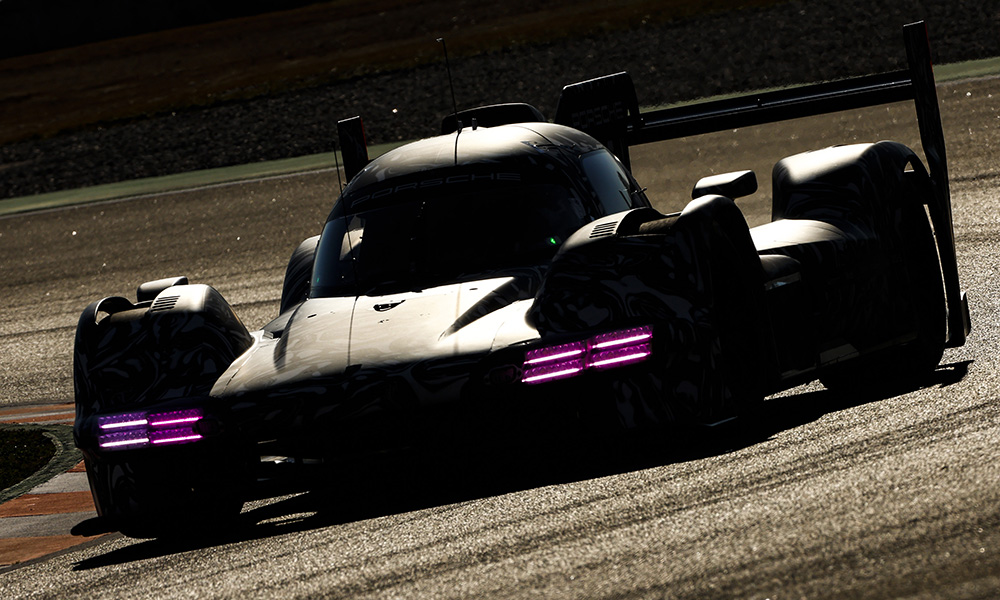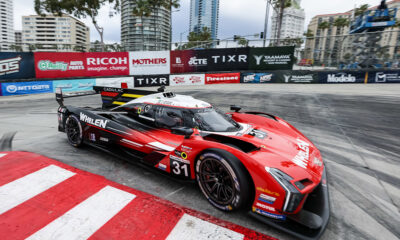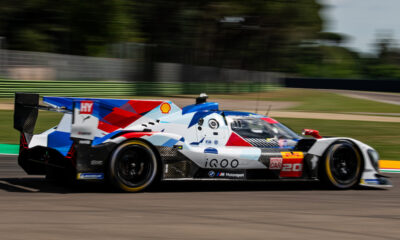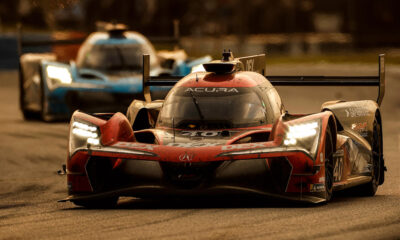
Photo: Porsche
IMSA has laid out the timeline for LMDh and LMH homologation and sanctioned testing heading into the 2023 WeatherTech SportsCar Championship season and its new GTP class.
The sanctioning body, in collaboration with the ACO, provided further updates to the integration of LMDh during a media briefing Wednesday evening, where representatives from both organizations as well as single-suppliers Bosch, Williams Advanced Engineering and Xtrac, were all on hand.
IMSA’s Vice President of Competition Simon Hodgson confirmed dates for two sanctioned tests later this year that will serve as key milestones in the development process of the joint IMSA-ACO platform.
A three-day test has been scheduled for Oct. 3-5 at Michelin Raceway Road Atlanta following its season-ending Motul Petit Le Mans, while an additional test is confirmed on Dec. 6-7 at Daytona International Speedway, which will be mandatory for any LMDh or LMH manufacturer wanting to compete in the 2023 Rolex 24 at Daytona.
Hodgson said there are approximately 25 separate manufacturer tests that will take place leading up to sanctioned testing, some of which will be shared amongst OEMs, in what has been characterized as “ongoing transparency and sharing” amongst groups.
While Porsche has become the first manufacturer to begin on-track testing with its LMDh car, additional cars are expected to come online in the second quarter of this year, according to Hodgson.
The German manufacturer’s recent multi-day test at Circuit de Barcelona-Catalunya marked the debut of the single-supply hybrid unit, which is currently also being validated in parallel dyno programs from other automakers.
“As you can understand, different manufacturers are introducing vehicles at different times,” Hodgson told Sportscar365.
“IMSA and ACO are trying to facilitate appropriate balanced testing between all manufacturers, the sharing of information, all leading up to the culmination of sanctioned testing.
“Now if you’re going to conduct sanctioned testing, normally, you want the car to be fully homologated.
“The reason the test isn’t mandatory in October is we’re still working through the homologation process, the inspection and the validation.”
Hodgson said there are key objectives with the overall schedule that’s been outlined.
“First and foremost, we want to absolutely define the final specification of the hybrid system,” he said. “In theory that is already done but we need the on-track validation.
“It appears to be a very sensible approach and one that everybody’s on the same page with.
“Now certainly we’re going to transition from the development phase to ‘these are the race specification which you will now test with throughout the course of the rest of the year.’
“Will everybody be ready in October and go to [Road] Atlanta? They may be, but the reality is maybe we won’t because we’re also trying to schedule the appropriate homologation timeline of each individual manufacturer.”
He said an exact homologation timeline for each manufacturer is not publicly shared information but falls around the sanctioned testing.
“But obviously, there’s a schedule associated with that,” Hodgson said.
“Certainly there’s a CFD process in advance of that and there’s the error characterization validation in the wind tunnel, then there’s a mechanical inspection.
“In advance of all there is documentation that needs processing and providing by each manufacturer.
“So as you can imagine, if you think about what we’re doing, a lot of work to be done and so it’s had to be organized, scheduled, there is going to be contingency plans in place if people can’t meet schedules.
“Because certainly all the cars need to be homologated in advance of competition.”
Hodgson: All Planned LMDh Programs Should Be Ready for Daytona 2023
While companies worldwide are facing supply-chain issues with components amid the COVID-19 pandemic coupled with Russia’s invasion of Ukraine — which has caused further disruptions — Hodgson doesn’t believe any of the currently announced LMDh programs for 2023 will be delayed.
In addition to Porsche, Acura, BMW and Cadillac are all expected to be ready for next year’s Daytona season-opener.
“We’re providing enough opportunity for them, even if they’re not commissioning vehicles at this moment in time, they’ve got what they need to start working through their own dyno powertrain process,” Hodgson explained.
“Eventually, they’ll announce and commission their vehicles. And as mentioned earlier, that point, of course, is going to be even more learning.
“Everybody’s got different cooling, everybody’s got different aerodynamics, even if there’s a common aero target.
“So the timeline, obviously, there are some with aggressive timelines, some that’s coming later than others. But the fortunate thing is, it’s not like a normal manufacturer program where it’s completely done in isolation.
“They’re going to learn everything from everybody at every stage.
“And of course, there’s always proprietary information related to how they run the cars. But when it comes to the system themself and adapting to any change necessary, they’ll be able to execute.”
LMH Requirements in WeatherTech Championship Outlined
IMSA technical director Matt Kurdock, meanwhile, confirmed that any LMH manufacturer wishing to compete in the WeatherTech Championship next year must inform IMSA by Sept. 1.
In addition to securing the necessary partnership agreements, the car must also undergo wind tunnel testing at the IMSA-commissioned Windshear facility in North Carolina, as is the case for all LMDh models.
Any LMH cars taking part in the GTP class next year must also be present for IMSA’s December sanctioned test.
So far, Toyota appears to be the most likely LMH manufacturer to be on the WeatherTech Championship grid for selected races next year although Toyota Gazoo Racing’s technical director Pascal Vasselon told Sportscar365 earlier this week that the Japanese manufacturer currently has “no firm plan” and it “remains something which at some point may be discussed.”
“There’s so much learning that we’re currently undergoing that is helping us to change, refine operational protocols should it be necessary, and we want to utilize the sanctioned test to put all of that in place,” Hodgson added.
“We want everybody, every manufacturer, every team to turn up at Daytona at the Roar, feeling that they’re well prepared, and they’ve had ample opportunity to get ready.
“So all of the partners are playing a strong role.”

























